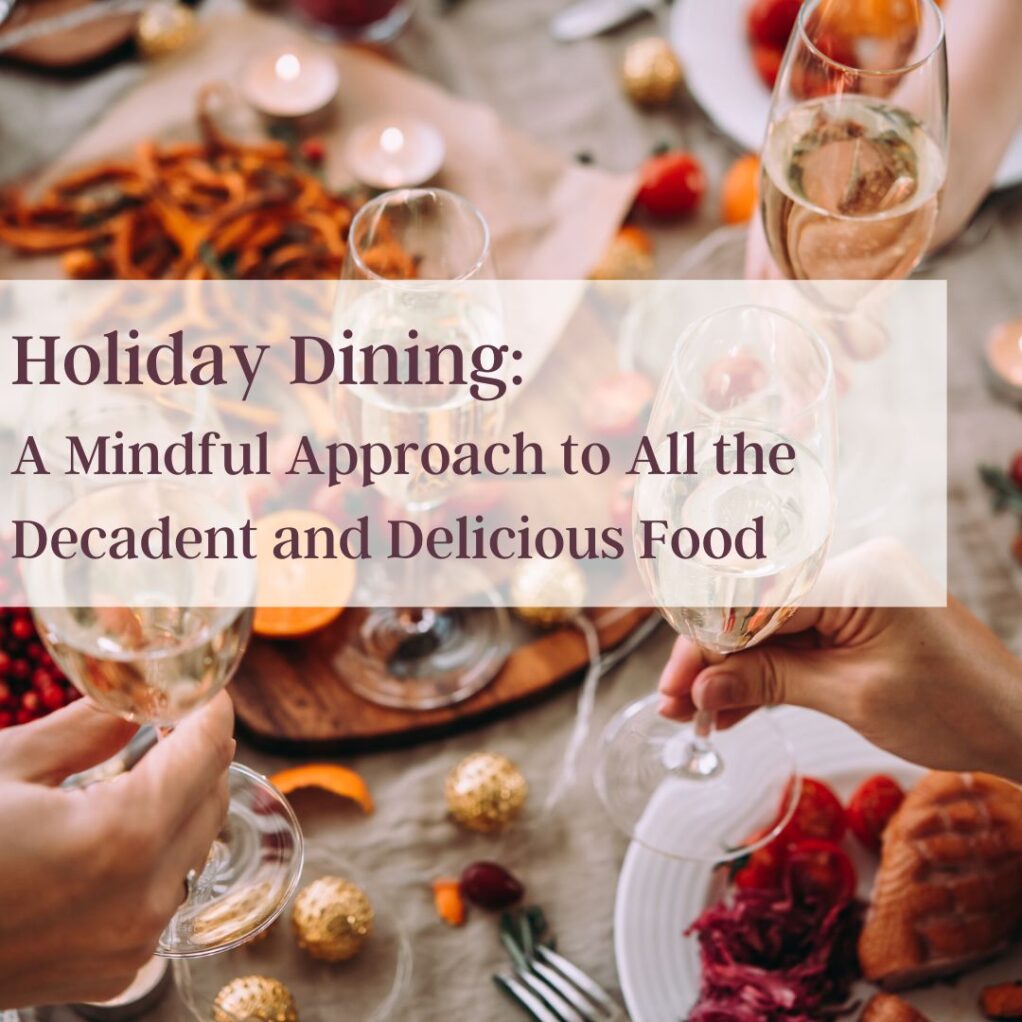
Dining with friends and family is one of the many pleasures of life. We love to celebrate with food, delicious decadent food!
With the holidays approaching, we find ourselves wondering how to enjoy all the celebratory gatherings without taxing our bodies with excessive calories and unhealthy choices. Here are a few tips:
Before the Gathering:
Hydrate – Before you go, make sure you are well hydrated. We often confuse thirst with hunger. When we are well hydrated, we feel more satisfied and content and this will influence all of our habits and choices, including our food choices.
Eat – Eat wholesome balanced meals before you meet for the gathering. Consider a high fiber breakfast such as oatmeal and chia porridge. A good amount of fiber early in the day can assist you in properly digesting a larger meal later in the day. Don’t show up “starving” hungry. When we are hungry, it is much harder to make good choices.
Plan ahead – If time permits, take a look at the menu before you arrive. Conveniently, most restaurants have their menus online. Take time to look at the menu before you arrive and identify some healthy options in advance. If attending a gathering at someone’s home, volunteer to take some healthy dishes to share with others, like vegetables and whole grains.
Don’t rush – Allow plenty of time to arrive at your destination. When we rush, we set off an entire chain of neurological stressors within our bodies. These stressors don’t just fade away when we arrive. We carry our stress into our activities and stress influences all of our choices, including our food choices.
During the Gathering:
Take a Moment – Before you eat, take a moment to check in and make you are present and aware of your environment. This is one of the many benefits of blessing our food before we eat. It acts as a mindful transition between the busyness of preparing the food and setting the table to the act of enjoying the food. Preparing the food and eating the food require very different energy. When preparing the food, you are often rushing and attempting to complete multiple tasks at once. The sympathetic nervous system is activated and digestion has been shut down. When you are eating your food, you want to be calm and at ease to activate the parasympathetic nervous system, thus signaling your body to re-prioritize digestion.
Food Sequencing – Make wholesome, nutritious food the priority and eat those foods first. Begin the meal with vegetables, whole grains, and salads. If you are going to have dessert or alcohol, eat your vegetables, proteins and healthy fats before to buffer the glucose spikes these foods can cause and also to temper your appetite before consuming high-sugar food choices.
Avoid empty calories – Desserts and alcohol are generally highly caloric and not nutrient-dense, so you’ll want to avoid or minimize consumption. In addition, sauces and salad dressings can be laden with sugar and unhealthy fats so you may want to skip these or ask for these condiments on the side, so you can consume them in moderation.
Slow down – It takes a while for your brain to recognize when you’ve had enough to eat, so you want to eat slowly to allow the brain time to get the message. Often times when we are eating with family and friends, we become so consumed with the conversation that we lose track of how much we are consuming. Be cognizant of this while sitting at the table and make it point to eat slowly and mindfully.
Stop Before You’re Stuffed – I know this one seems like a no-brainer. Many times, we are enjoying our food so much that we don’t stop eating even after we know we are full. We stuff in a few extra bites after our brain is signaling that we are full. Do not overburden your digestion. Many people feel obligated to finish everything on their plate. This may be residual conditioning from our childhood. Give yourself permission to stop eating when you are full.
After the Gathering:
Take a walk – It’s important to take at least 100 steps after each meal, especially a large holiday meal. Walking will raise your metabolism, improve digestion and encourage peristalsis. If you cannot take a walk, help clean the kitchen and clear the table. Any moderate movement after a meal can be helpful.
Sit tall – If you must sit after a large meal, be sure to sit up tall with posture aligned to avoid compressing the abdomen. When we slouch, we create compression through the front side of our body which impacts our digestive system and makes it harder to digest our food. If and when you sit, sit tall with your spine properly aligned in an upright position to aid your digestion. Sit either cross legged which is said to divert energy from the legs into the digestive tract and heart center. If you cannot sit cross legged, sit with your feet on the floor. The contact with earth helps to ground the body and increase the downward moving energy which signals peristalsis.
Continue to hydrate – Your body needs water to aid in digestion. Casually sip water; don’t chug. Ideally, the water should be warm or room temperature. Stop drinking 2-3 hours before bed to avoid having to get up in the middle of the night.
Enjoy – Finally, enjoy your meal. Don’t stress about any of this. Breathe calmly and deliberately. Enjoy the company of your friends and family!


